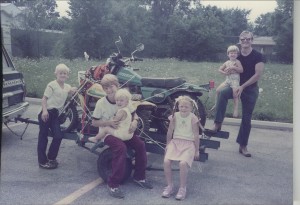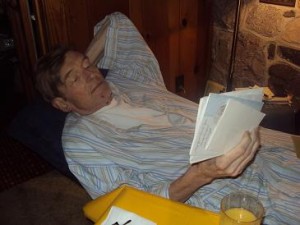We’ve all heard the old adage, “We don’t appreciate what we have until we’ve lost it.” In losing Nate, it wasn’t quite like that for me.
Back in 1991, Nate and I were “under the gun.” His real estate investment firm which had been doing exceptionally well had gone under, thanks to a governmental law change lawmakers promised they wouldn’t make but did. We had seven children under our roof then. Among them was an extremely strong-willed pre-schooler and a teen in full rebellion with police issues and court room drama.
The other children all needed attention, too, and our dinner table included ages 18, 16, 14, 10, 9, 3 and 1. Money was extremely tight (think stranglehold) and tensions ran high. I wasn’t understanding Nate’s pressures, and he wasn’t understanding mine. It wasn’t that we were fighting. We just tried to avoid each other, a recipe for marriage disaster.
I grew nervous about what might happen in our relationship but not enough to humble myself and reach out. I did wonder if we might be going over the brink, which terrified me. Being a stay-at-home mom with seven dependent children, I knew I had to do something. I decided I’d try to look on the bright side, and since everything around me looked dark, I’d have to look back to a time when things had been better.
I thought about when I’d followed Nate around like a puppy dog and loved every minute with him. I had old journals to prove it, in which I’d written at length about my endless infatuation. So, one middle-of-the-night when I was up feeding the baby, I decided to make a list of every positive quality Nate had. I wrote an upbeat title on top: “Nate My Mate, a Great Date.” I didn’t feel happy as I approached the task, but in my heart I knew I didn’t want my marriage to fall apart, as difficult as it was.
I started with some bare-minimums and thought I’d only be able to think of five or six good things. Once I got started, though, an amazing thing happened. The list grew.
Here it is, now 18 years old:
- nice teeth
- blond hair
- good looking
- intelligent
- a good list-maker
- confident at work
- remembers to do what he said he would do
- organized
- good physical stamina
- physically coordinated
- willing to lead
- willing to study the Bible
- willing to discuss any topic with me
- flawless honesty
- studies each child
- interested in each child as an individual
- willing to help with homework
- knows everything about academic subjects
- great memory of facts, history and family history, remembers names
- good decision-making ability
- not put off by hard office work
- doesn’t need much sleep
- desires to be a good husband and father
- is sensitive to my requests of him, does them first
- great sex partner
- doesn’t give up when discouraged
- sets high goals
- puts me on a pedestal
- generous with money, doesn’t spend on self
- courteous, with good manners
- interesting conversationalist
- makes friends easily
- wants to provide for our family
After I made the list, I felt terrible about my selfish attitude. On paper, Nate was a great catch, and I wanted to get back to those brighter times. It was two more edgy years before we decided to start counseling and an additional eight months before we felt our marriage had been healed of the wounds we’d caused each other.
As we approach our first Thanksgiving without Nate, I could never be thankful for the wretched cancer that took him away, but I can definitely be thankful for the 40 years we had together without the cancer. He and I came to appreciate each other anew 18 years ago, and it started with a middle-of-the-night list. As a result, I’m grateful this Thanksgiving that I’m not saying, “I didn’t appreciate who I had until I lost him.”
“Don’t let anyone capture you with empty philosophies and high-sounding nonsense that come from human thinking and from the spiritual powers of this world, rather than from Christ. Let your roots grow down into him, and let your lives be built on him. Then your faith will grow strong in the truth you were taught, and you will overflow with thankfulness.” (Colossians 2:8,7)

